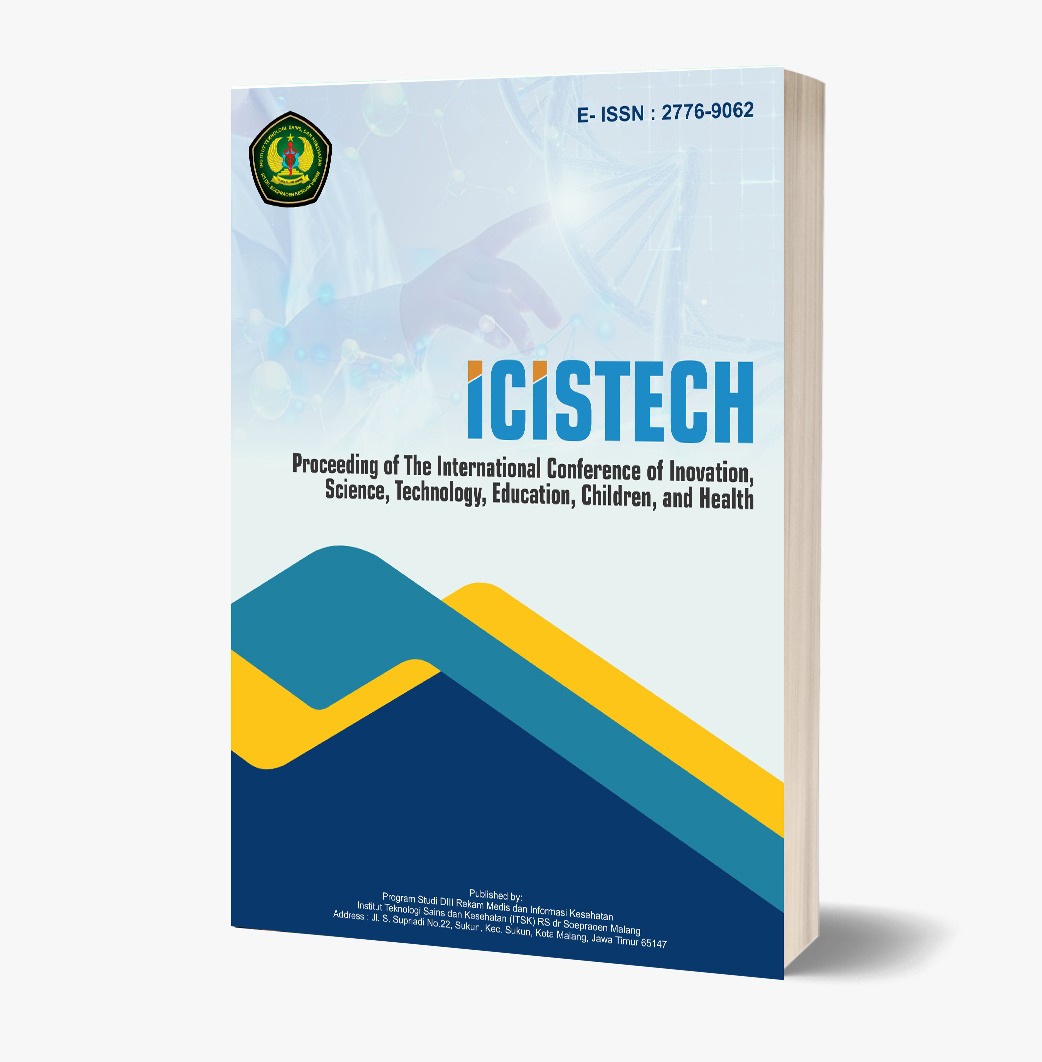Relationship Between Pregnant Women’s Knowledge of Iron Tablets and Adherence to Iron Tablet Consumption at Saritani Health Center
DOI:
https://doi.org/10.62951/icistech.v5i1.249Keywords:
Compliance, Iron tablets, Maternal KnowledgeAbstract
Anemia is a common condition among pregnant women, often caused by insufficient iron intake or poor absorption due to digestive issues. This condition can have serious implications for both maternal and fetal health. The primary objective of this study was to explore the relationship between pregnant women’s knowledge about iron tablets and their adherence to the prescribed regimen at Saritani Health Center. This study utilized a quantitative approach with a cross-sectional design. The population for this study consisted of all pregnant women visiting Saritani Health Center, with a sample size of 78 women selected through purposive sampling, based on predetermined inclusion criteria. The study’s findings indicated that the majority of respondents had a sufficient level of knowledge regarding the importance of iron tablets. A statistical analysis using the Spearman Rank test revealed a very strong correlation between the level of knowledge about iron tablets and adherence to their consumption, with a correlation coefficient of rs = 0.812 and a p-value of 0.000 (p < 0.05). This suggests that the higher the level of knowledge about iron tablets among pregnant women, the greater their compliance with taking these supplements. The study also found that while most respondents had sufficient knowledge about iron tablets, their compliance was moderate, which highlights the importance of ongoing education and support. The results of this study emphasize the critical role that knowledge plays in improving compliance with iron supplementation among pregnant women. Health education initiatives targeting pregnant women should focus on increasing awareness and understanding of the benefits of iron supplementation to prevent anemia and its associated risks. This study calls for enhanced counseling and educational efforts at the community health level to ensure better maternal health outcomes.
References
Almriyantihaliah, A. (2019). Relationship of pregnant women's knowledge about iron tablet consumption with anemia in the working area of UPT BLUD Kediri Community Health Center, West Lombok Regency, 2018.
Citra. (2014). Relationship between knowledge and adherence to consuming iron tablets (Fe) in Tareran District. Faculty of Public Health, Sam Ratulangi University, Manado.
Elvira, D., et al. (2023). Risk factors for anemia in pregnant women. Jurnal Edu Health, 14(04), 515-519.
Erwin, R. R., & Machmud, R. (2017). Relationship of knowledge and attitude of pregnant women with adherence in consuming iron tablets in the working area of Seberang Padang Community Health Center, 2013. Jurnal Kesehatan Andalas, 6(3). https://doi.org/10.25077/jka.v6i3.744
Harahap, D. A., Zaliniah, Z., & Sartika, Y. (2023). Maternal behavior during pregnancy in efforts to prevent stunting in children born in Kampar Regency. Jurnal Kesehatan Komunitas, 9(1), 149-156. https://doi.org/10.25311/keskom.Vol9.Iss1.1450
Hastanti, H. (2019). Relationship of knowledge with adherence of pregnant women in consuming iron tablets (Fe) in the working area of Lawangan Community Health Center, Poso Regency. Journal of Islamic Medicine, 3(1), 17-23. https://doi.org/10.18860/jim.v1i4.7086
Hidayah, W., & Ansari, T. (2012). Relationship compliance with pregnant women consuming Fe tablets with the event of anemia in Pageraji Village, Cilongok District, Banyumas Regency. Jurnal Ilmiah Kebidanan, 3(2), 41-53.
Kemenkes. (2020). Profil kesehatan Indonesia 2020. Jakarta: Departemen Kesehatan.
Litasari, D., et al. (2014). Adherence to taking iron tablets with increased Hb levels in pregnant women at Purwoyoso Community Health Center, Semarang.
Muzayyana, A., Santoso, S., & Noviawati, D. (2016). Relationship of knowledge level with anemia incidence in pregnant women in the working area of Godean I Community Health Center. Jurnal Kesehatan Ibu dan Anak, 9(1).
Nasrudin, N., Prisusanti, R. D., Syofya, H., Maidelwita, Y., & Yuliati, L. (2024). Education to improve the healthy life of rural communities in accelerating the reduction of stunting. Journal of Human and Education (JAHE), 4(1), 63-69. https://doi.org/10.31004/jh.v4i1.546
Notoatmodjo, S. (2012). Metodologi penelitian kesehatan. Jakarta: Rineka Cipta.
Prisusanti, R. D. (2021). Metodologi penelitian di berbagai bidang.
Stephen, G., Mgongo, M., Hussein, H. T., et al. (2018). Anemia in pregnancy: Prevalence, risk factors, and adverse perinatal outcomes in Northern Tanzania. Journal Hindawi Anemia. https://doi.org/10.1155/2018/1846280
Wibowo, N., et al. (2021). Anemia defesiensi besi dalam kehamilan. UI Publishing.
World Health Organization (WHO). (2019). Prevalence of anemia in pregnant women (age 15-49) (%). Online as of January 5, 2022.
Yunika, R. P. (2021). Relationship of knowledge level about anemia with adherence to taking blood supplement tablets in third trimester pregnant women. Nutriology: Jurnal Pangan, Gizi, Kesehatan, 2(2), 1-7. https://doi.org/10.30812/nutriology.v2i2.1583
Downloads
Published
How to Cite
Issue
Section
License
Copyright (c) 2025 Proceeding of The International Conference of Inovation, Science, Technology, Education, Children, and Health

This work is licensed under a Creative Commons Attribution-ShareAlike 4.0 International License.













